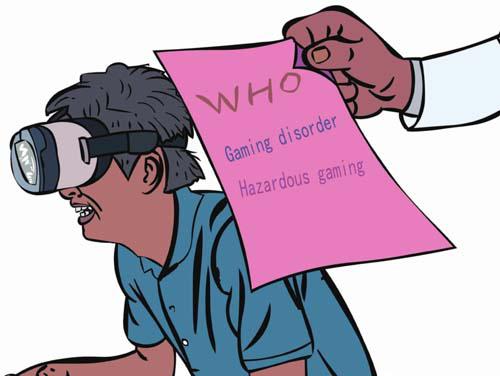What Will Result From the WHO’s Proposal on Gaming Disorder?

The World Health Organization (WHO) recently added gaming disorder to the latest draft of the International Classification of Diseases manual (ICD-11), a comprehensive guide to disease classifi cation.
“Gaming disorder is characterized by a pattern of persistent or recurrent gaming behavior(‘digital gaming or ‘video gaming), which may be online or offline,” the manual says. The symptoms listed by the WHO include: a lack of control over gaming; giving gaming precedence over other life interests and daily activities; and the continuation or escalation of gaming despite negative consequences. If approved by member states at the World Health Assembly in May 2019, the proposal will take effect on January 1, 2022.
The news has attracted considerable attention around the world. While it has been met with anger by the gaming industry, the classifi -cation could provide a benchmark for doctors to potentially provide better diagnoses and treatment for patients. However, some argue that clinical research is insuffi cient to establish a widely-recognized benchmark for the disease. Worries have also emerged that the classification will reinforce parents anxiety over childrens addiction to online gaming, which might lead to the proliferation of unscientifi c and punitive treatment of the kind that has already been seen in China.
A scientific standard
Zhang Tiankan (Guangming Daily): The debate around whether or not to classify gaming disorder as a disease has always been controversial. The WHO ICD-11 draft not only affirms more than 10,000 previous revisions, but also proposes new standards for existing and new diseases, with gaming disorder added to the section for addictive diseases.
For a new disease to be confi rmed, approval must come not only from WHO member states but from the relevant disease commissions in these countries as well. This is a responsible and scientifi c way to confi rm the existence of a disease. The consideration given to gaming disorder by the WHO indicates that this condition is increasingly recognized by global society, and there is no doubt that scientific and concrete standards will be conducive to the diagnosis and treatment of the disease.
Clinical research and practice are now necessary to determine how best to cure gaming disorder and set up treatment standards. There are reports that electric shock therapy has been used in China to treat such conditions. This treatment is not only ineffective but has negative physical and psychological consequences.
Gaming disorder is extremely harmful to adolescents and adults. According to the third survey on gaming disorder from the China Youth Internet Association, about 14.1 percent, or 24.04 million, young Internet users suffer from some form of gaming disorder, while around 12.7 percent, or 18.58 million, have displayed addictive tendencies which are yet to develop into a disorder. Patients with gaming disorder can become violent or incapacitated as a result of the condition, unable to deal with reality and in some extreme cases even at risk of suicide. Gradually, they become marginalized in society.
How to cope with gaming disorder? Chinas health authorities need to do more research in line with the WHOs diagnosis benchmark as a way to improve peoples understanding of the condition. It is also important to cure people of their addiction to games through various methods such as psychological counseling, education and family and behavioral instruction. Gaming disorder, as with addictions of all kinds, is a complicated and persistent problem, multifaceted in its causes and requires more than just medical treatment.
Fu Qing (Nanfang Daily): According to the WHO, mental health is not just the absence of mental disorders. It is defined as a state of health in which every individual realizes his or her own potential, can cope with the normal stresses of life, can work productively and fruitfully, and is able to make a contribution to his or her community. Around the world, 450 million are living with mental health problems, but many of them only display relatively minor symptoms such as emotional anxiety. By adding gaming disorder to the ICD-11, the WHO is trying to draw peoples awareness to mental health and increase peoples ability to better control themselves so as not to be enslaved by gaming.
The WHO has offered an explicit answer to a controversial question. Even without scientifi c conclusions, some social organizations have already labeled video game addiction as a disease and forced recovery programs are imposed on patients. As a result, childrens behavior is exaggerated. If they game for six hours or more every day, they will be deemed addicts. They are sent to rehabilitation centers once their academic grades begin to suffer, and when electric shock therapy is banned by the health authorities, parents do not understand why.
The comprehensive assessment proposed by the WHO includes the frequency and intensity of gaming, in particular the duration. The patient must present certain behaviors for at least 12 months before the disease can be conf irmed. The WHOs practice will help to remove doubts and standardize social health agencies involved in the treatment of gaming disorder.Many gamers overindulge, but fall short of the benchmark for gaming disorder, and the incidence of confirmed cases is relatively low. Parents should not be concerned by the WHOs proposal to list game addiction among mental health conditions. On the contrary, the incidence of gaming disorder refl ects problems in communication between parents and their children, as well as their modes of discipline and education. Parents should pay more attention to their childrens behavior instead of always blaming them.
Joint effort needed
Wang Zhongdi (China Youth Daily): It is good to look at gaming disorder from a scientifi c perspective. There is currently a strong bias against video games in Chinese society, with some teachers and parents seeing games in general as evil. Scientifi c classifi cation and standards can help the public to better understand the role of games as entertainment.
The problem is that the public are yet to develop a clear understanding of gaming disorder. Public debate and policy lack scientifi c rationale. Even prior to the ICD-11, much attention was being paid in China to gaming disorder, and there are a lot of rehabilitation programs aimed at tackling the condition.
If gaming disorder is confi rmed as a disease, then the health services should start preparing themselves for its treatment. Public hospitals should set up relevant departments and draconian treatments for addiction must be curtailed.
The harm caused by gaming disorder is related to the business ethics of game producers, and the education and supervision of schools and families. Social factors are also important. In China, people lack even a basic knowledge of mental health conditions, resulting in bias toward these disorders as well as indifference. While ostensible issues like gaming addiction get a lot of attention, other potential risks like depression are often neglected. People should not overemphasize the problem of gaming disorder at the expense of other mental health issues.
In fact, the vast majority of people do not need to worry about their chances of suffering with gaming disorder. Even the ICD-11 says that for gaming disorder to be diagnosed, patterns of behavior must be of suffi cient severity to result in signifi cant impairment in personal, family, social, educational, occupational or other important areas of functioning. In reality, very few people are affl icted in the clinical sense.
Gaming addiction in the eyes of the Chinese public is probably different from the gaming disorder defi ned by the WHO. As no consensus has been reached on the basic concept and its recognition, it is hard to know how to proceed, and public misunderstanding may cause even greater risks.
Whether gaming disorder is included in the ICD-11 or not, people will always indulge in video games and gaming will continue to be a mass medium of entertainment. New classifications of gaming-related disorders are not supposed to cause alarm, and people should maintain a rational attitude toward gaming and its infl uence on people, so as to provide a healthier online environment for the youth.

